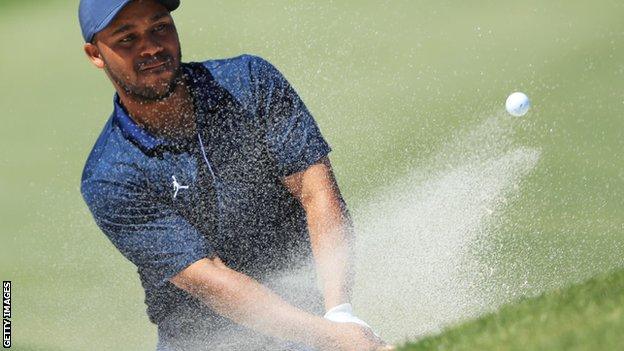'PGA Tour's return about so much more than birdies and bogeys'
- Published

PGA Tour player Harold Varner III has been outspoken on the need to tackle racism
Charles Schwab Challenge - return of the PGA Tour |
|---|
Dates: 11-14 June Venue: Fort Worth, Texas |
Coverage: BBC Sport will have live coverage of all four days with commentary on BBC Radio 5 live Sports Extra and text updates on the BBC Sport website |
This week's tournament at Colonial Country Club in Texas is more than a mere test of whether big time sport can be successfully held at a time of global pandemic.
That has proved only the initial challenge since the PGA Tour outlined plans to resume play for the first time since the Players Championship was abandoned after one round on 12 March.
Golf has been at the forefront of the sporting return from lockdown. For most of us it has been at recreational level but in the United States - with the encouragement of the country's president - it is at the vanguard for restarting professional sport.
But it returns not only at a time when public and economic health have been savaged by Covid-19 but amid widespread civil unrest following the death in police custody of George Floyd in Minneapolis on 25 May.
Golf has often been guilty of living in isolation from the woes of the world. It has been a means of escape from troubled times for those fortunate enough to access courses to play or watch the game.
This week, though, it steps into a spotlight made more intense by the absence of international sport over the past three months. It returns in Fort Worth, Texas, only a four-hour drive from where Mr Floyd is being laid to rest in Houston.
With the world watching, the tournament will be played in an isolating bubble hopefully protecting all involved from coronavirus.
But it cannot exist in isolation from, or in ignorance of, the circumstances that have prompted so many global protests and support for black communities.
There has already been a response. In recent days Tiger Woods, Jon Rahm, Brooks Koepka and Justin Thomas, among other leading professionals, have posted messages highlighting the need to tackle racism.
Harold Varner III, a black PGA Tour player, wrote: "Sometimes life is not simple and things don't make sense. How can we call ourselves the greatest country on earth when our standards fall to senseless killing?"
These words come from a player of a game not renowned for "taking the knee". They reflect a social consciousness currently permeating traditionally one of the most conservative of sports.
PGA Tour commissioner Jay Monahan has taken a lead. "We might not know exactly what to do right now but we shouldn't be deterred," he said.
"We should communicate and learn. We should talk to our family, friends and colleagues in an open and compassionate way.
"We should grow as individuals and as an organisation. And, most importantly, we should demand better."
They are strong words setting a responsible tone ahead of what was always going to be a hugely significant week for the sport. Staging tournament golf again was already a massive test given current public health concerns.
Leading players have responded to the opportunity to compete again. Each of the top five players in the world; Rory McIlroy, Rahm, Koepka, Thomas and Dustin Johnson headline the field for the Charles Schwab Challenge starting on Thursday.
Fifteen of the world's top 20 are playing despite the absence of spectators at Colonial. It is the first of four events to be played behind closed doors and July's Memorial tournament plans to be the first back with galleries.
This week television coverage will be improvised and the atmosphere will be inevitably eerie when so many of the world's best players compete in the absence of cheers and applause.
Armchair fans, though, are likely to relish the return of competitive action in what represents a huge opportunity for the sport and its players. But success will not necessarily be measured by birdies and bogeys.
This opening event and those that follow must show they can exist in a safe, healthy bubble, but one that is not impervious to everything else happening in a troubled world.
